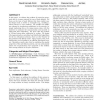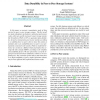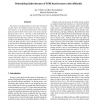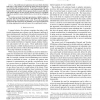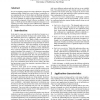136
click to vote
MOBIHOC
2010
ACM
14 years 12 months ago
2010
ACM
In this paper, we address the problem of preserving generated data in a sensor network in case of node failures. We focus on the type of node failures that have explicit spatial s...
128
click to vote
GLOBECOM
2010
IEEE
15 years 1 days ago
2010
IEEE
Streaming erasure codes encode a source stream to guarantee that each source packet is recovered within a fixed delay at the receiver over a burst-erasure channel. This paper intro...
109
click to vote
CORR
2006
Springer
15 years 2 months ago
2006
Springer
We consider the problem of constructing an erasure code for storage over a network when the data sources are distributed. Specifically, we assume that there are n storage nodes wit...
114
click to vote
CORR
2010
Springer
15 years 2 months ago
2010
Springer
The high repair cost of (n, k) Maximum Distance Separable (MDS) erasure codes has recently motivated a new class of codes, called Regenerating Codes, that optimally trade off stor...
128
click to vote
DSN
2008
IEEE
15 years 3 months ago
2008
IEEE
XOR-based erasure codes are a computationallyefficient means of generating redundancy in storage systems. Some such erasure codes provide irregular fault tolerance: some subsets o...
138
click to vote
CCGRID
2004
IEEE
15 years 5 months ago
2004
IEEE
In this paper we present a quantitative study of data survival in peer to peer storage systems. We first recall two main redundancy mechanisms: replication and erasure codes, whic...
127
click to vote
DSN
2009
IEEE
15 years 6 months ago
2009
IEEE
In large storage systems, it is crucial to protect data from loss due to failures. Erasure codes lay the foundation of this protection, enabling systems to reconstruct lost data w...
128
click to vote
DSN
2007
IEEE
15 years 6 months ago
2007
IEEE
We propose a new fault tolerance metric for XOR-based erasure codes: the minimal erasures list (MEL). A minimal erasure is a set of erasures that leads to irrecoverable data loss ...
102
click to vote
SIGCOMM
1998
ACM
15 years 6 months ago
1998
ACM
—The proliferation of applications that must reliably distribute bulk data to a large number of autonomous clients motivates the design of new multicast and broadcast protocols. ...
109
click to vote
AC
2003
Springer
15 years 7 months ago
2003
Springer
We are investigating strategies for using replication to design and implement highly reliable peer-to-peer systems. In particular, we are comparing the use of whole object and blo...
